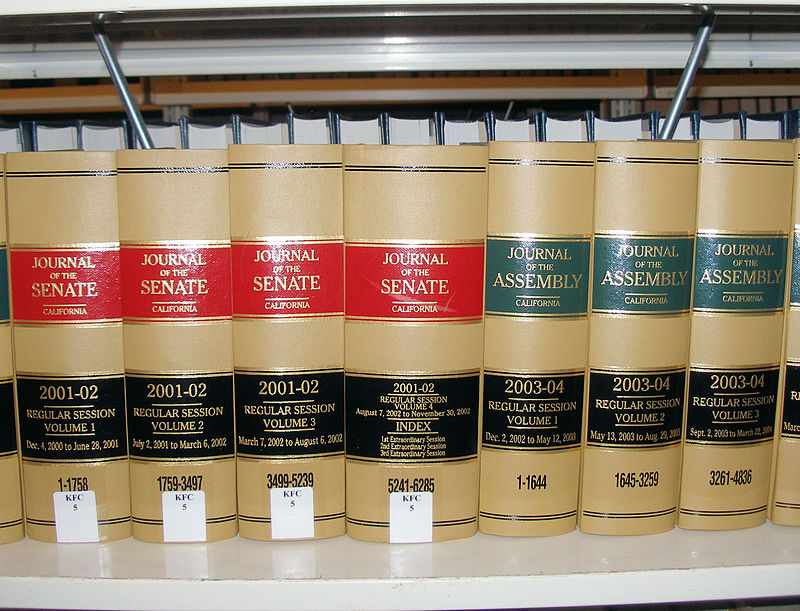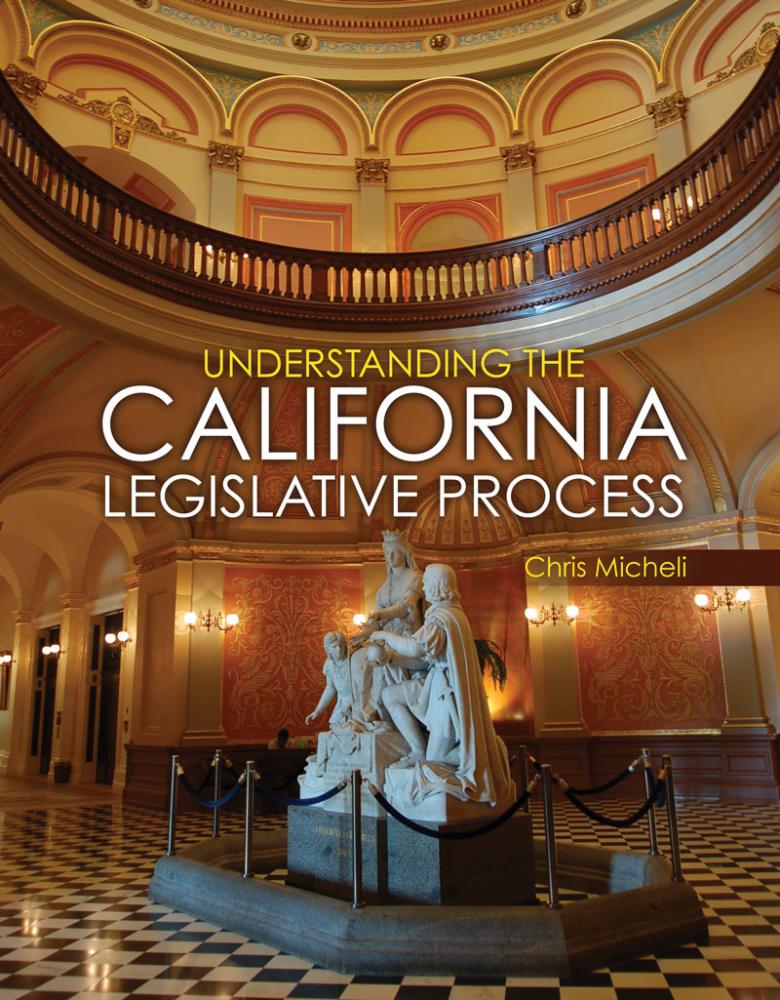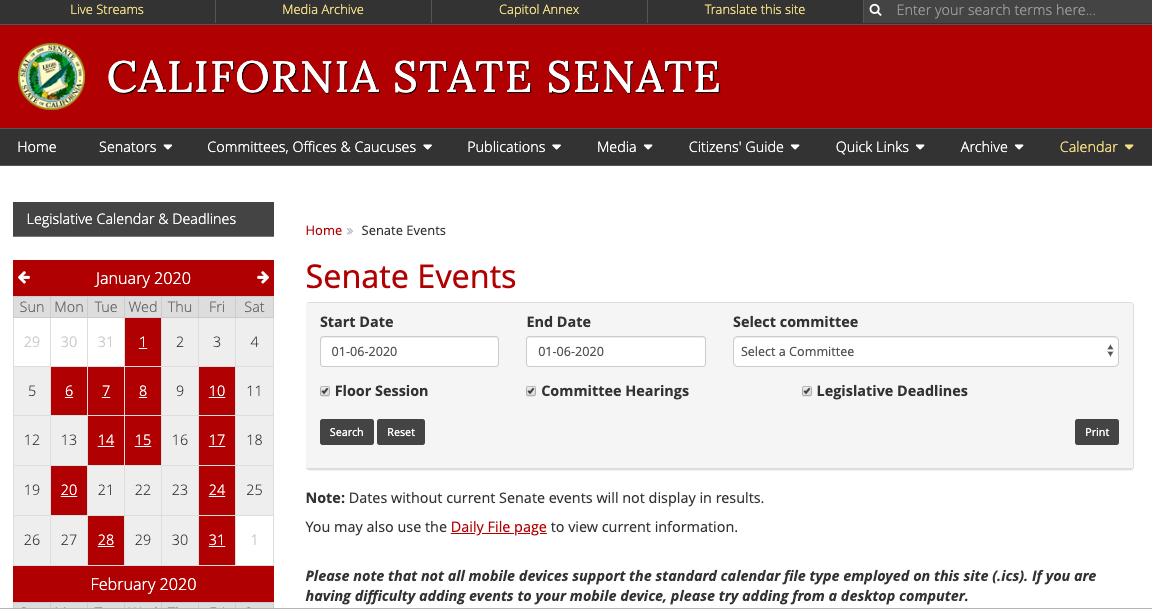
Journals of the California Legislature. (Photo: Wikipedia)
Teaching Lawmaking in California
Understanding the scope and power of the Legislature
By Chris Micheli, March 6, 2020 5:37 am
By Chris Micheli and Diane Boyer-Vine
As part of its efforts to enhance its Capital Lawyering Program, the University of the Pacific, McGeorge School of Law offers a number of courses to train aspiring lawyers who plan to work in and around government. One such course is Lawmaking in California, a course which covers the fundamental components of the California legislative process, as well as discussions involving the rulemaking process and avenues of direct democracy.
The Lawmaking in California course is in integral part of McGeorge’s overall curriculum in its Capital Lawyering Program. After students take the required Introduction to Capital Lawyering class, this course and the California Lobbying and Politics course are next in the sequence, with students usually then participating in the popular Legislation and Public Policy Clinic where all of their coursework is put to the test.
Course Overview
The topics covered in this course include legislative procedure, bill drafting and analysis, legislative history and intent, advocacy, relationships with the executive branch, and the powers and limits of the legislative branch of state government. Students in this class learn about statutory and regulatory lawmaking and develop important legal skills of research, analyzing and writing by having practical experience in drafting legislation and bill analyses.
This course is taught in downtown Sacramento at the State Capitol, rather than on the law school campus, as this provides students with the feel of the practice of capital lawyering. The course runs 14 consecutive weeks and meets once per week in the evening for 2 hours. It begins right after the workday concludes so that guest speakers in and around the State Capitol can easily make class presentations.
This course exposes students to numerous aspects of the legislative process and the making of statutory law and its increasingly critical role in our legal system. This course also prepares students who want to continue their studies in the legislative arena by participating in the Legislation and Public Policy Clinic. The course relies heavily on class discussion with guest speakers bringing expertise and insights into topics covered.
This course is unique – we believe it is one of only a handful of law school courses dedicated specifically to forms of lawmaking in California. While regulatory process and direct democracy are briefly covered in two separate class sessions, the bulk of the course focuses on the state legislative process and the influences over that process.
Prior Version of this Course
This class was formerly the Legislative Process, Strategy and Ethics course, and was also intended to expose law students to the practical world of politics and the lawmaking process. Changes from the previous iterations of this course included the addition of a 600-page reader full of substantive information that could readily be used as a reference guide for anyone working in or around the legislative and/or regulatory processes. Both a mid-term and final exam were created and writing assignments were added.
As a result of these substantial changes, the course went from a P/F basis to a graded class. This course is intended to provide a great deal of substantive material and practical knowledge so that a student who successfully completes this course, along with the California Lobbying and Politics class and Legislation and Public Policy Clinic could work in and around the State Capitol immediately.
Course Materials
This course does not use a standard textbook. Instead, it uses a Reader which was written and compiled by Professors Chris Micheli and Diane Boyer-Vine. The Reader provides students with the essential background to participate in class discussions and consider the case studies that will be used during the semester. The Reader is comprised of two volumes of materials.
In terms of the class reader, most recently called Materials and Cases on Lawmaking in California, the professors hope that it will serve in the future as a reference guide, something that graduates will keep on their credenza or bookshelf at their job in or around the State Capitol. Some of the material may need to be updated on occasion, but most of the material is not likely to change much so that it will be of benefit in the future.
Several of the guest speakers provide additional written materials for the students. They receive examples of all types of bills, budget materials, and other relevant materials that can be used as reference guides in the future.
Course Exams
There is a graded mid-term exam worth 20% of the final grade, as well as a final exam at the end of the course, which is also worth 20% of the student’s final grade. Each exam covers half of the course. The exams consist of multiple choice, true/false and short essay questions. The mid-term is given in the second hour of the seventh class, and lasts one hour. The final exam is given during “exam week” after the conclusion of classes and lasts 90 minutes.
We have found that true/false, multiple choice and short essay questions enable us to adequately test the information from class. All exam questions are clearly in the written materials, are discussed during the appropriate class session, and are of a nature that would be expected to be known. The exam questions are intended to ensure that students know and understand the salient points from the respective class sessions and topics. They essentially test what students should derive from the topics covered.
Although graduates of the class will not have the same practical work experience of those working under the Capitol Dome, they will have been exposed to many of the common issues and scenarios that experienced individuals will have over a number of years working in and around the Capitol.
Bill and Amendment Drafting Projects
The first written assignment is the drafting of a bill and two substantive amendments to the bill. We explain that this first task is to draft a bill on a topic of the student’s choosing. The bill should not exceed 10 pages, single-spaced. The bill must be an AB or SB and must follow exactly a bill as introduced in the California Legislature.
The purpose of this writing assignment is to provide an opportunity to participate in one of the most important roles of a legislative lawyer – drafting bill language. Students must first decide upon a state public policy issue that they want to address by legislation. Then they must research that issue and decide upon what type of statutory language is needed — adding new code sections and/or amending existing code sections.
Then the hard part comes – drafting the actual bill text. Although an entire class period is spent with the Chief Deputy Legislative Counsel who walks students through all of the possible versions of bill drafts and amendments, the drafting will fall upon the student.
The second amendment is to draft a substantive amendment to address one or more opposition concerns that could be raised with the original bill. There is also required a drafting of an urgency clause and the justification for why the bill should take effect immediately as an urgency statute. The students are required to combine both of these amendments into a second draft of the bill.
In evaluating the bill and amendment drafting project, the professors look for accuracy in the bill language, that the bill format is followed, the rules of statutory construction are kept in mind, and that the language is easily understood.
Bill Analysis Drafting Project
A few weeks after completing the bill and amendment drafting project, the students will switch hats and become committee consultants as they prepared a lengthy policy committee analysis of their drafted bill in its amended form.
The second writing assignment is to research and write an analysis of the amended bill. Significant thought and analysis will go into this writing assignment, which also must be done in an objective manner, similar to the bill and amendment drafting project.
An entire class period is spent with the staff director of a legislative committee who shares insights on how to research and write a thorough bill analysis that could be relied upon by legislators and staff to make a decision about how to vote on a bill and by practitioners who could understand what was intended by those voting to enact the bill’s provisions.
Similar to the bill and amendment drafting project, the hard work naturally comes with drafting the actual bill analysis that is limited in page length, but that is expected to be thorough and demonstrate a clear understanding of how and why to analyze legislation.
In evaluating the bill analysis drafting project, the professors look for the students following the format for a policy committee bill analysis, writing a clear and concise explanation of the bill’s provisions, analyze the measure’s provisions, and provide an independent description of the arguments that would likely to be posed for and against this bill.
Student Participation
The course is interactive and student participation is crucial to the learning experience. The students’ final grade may be increased or decreased by 1/3 as the participation component of the students’ grade is designed to enhance their learning experience, as well as their oral participation and advocacy skills.
Attendance and class participation are an integral part of this course in order to facilitate learning by the students. Regardless of whether there is a small number of students in a seminar room or a large classroom filled dozens of students, the quality and quantity of student participation is necessary for success in a course such as this.
Through the professors’ use of the Socratic Method of teaching, lecturing, sharing perspectives among participating students, and class discussions, students will be called upon to apply their knowledge and utilize their critical thinking and analysis skills. There are numerous opportunities to engage in these interactive discussions, and the professors assess the student’s ability to apply knowledge and critical thinking skills.
The professors will also assess the student’s ability to identify and understand key concepts in substantive law and procedure that are reviewed and discussed in the readings and class sessions. Finally, the professors will assess the students’ communication skills, including effective listening and critical reading, as well as interpersonal speech and oral advocacy.
Guest Speakers
The guest speakers are always leading experts in their fields and have extensive experience and key insights to share with students to gain exceptional insight in particular aspects of state government in California. Critical readings are provided to students in advance so that they are exposed to key issues for the relevant class discussions each week and can engage in valuable interactions with the guest speakers.
Overview of Weekly Class Sessions
The first class deals with a course overview, review of the syllabus and begins in earnest with views on the Legislature and the lawmaking process. The learning objective is to gain a high-level understanding of representative democracy and how legislatures are viewed in America. The purpose is to understand where this course fits into the McGeorge Program and then to understand views of legislatures in general.
The second class is the first one on the legislative process, which covers the legislative calendar and the committee system. There are two guest speakers: a committee secretary or assistant and either the Senate or Assembly Bill Referral Consultant. We examine the Assembly and Senate legislative processes. The learning objective is to understand legislative rules that apply to bills and amendments moving through the legislative process. This class focuses on bill introductions, amendment deadlines, and rules that relate to bill referrals and the committee process.
The third class deals with legislative powers and limits, reviewing constitutional provisions and relevant case law. The class speaker is the former Chief Deputy Legislative Counsel. This class involves a thorough examination of the legislative branch of government. The learning objective is to understand the scope of the powers of the legislative branch vis-à-vis the judicial and executive branches. Also, we review the scope of legislative power as it relates to the people’s power of initiative and referendum.
The fourth class returns to the legislative process, this time examining floor sessions and legislative publications. The Secretary of the Senate and the Chief Clerk of the Assembly are the guest speakers. The learning objective is to understand legislative rules which apply to bills and amendments moving through the legislative process. This session focuses on the floor process and will introduce students to various legislative publications that are useful to working effectively in the process.
The fifth class turns to drafting bills and amendments. The class period is spent with the current Chief Deputy Legislative Counsel. The purpose is to gain an understanding of bills and amendments and specific drafting rules used by the Legislative Counsel. The learning objective is to understand the basic tools of drafting legislation in California from initial inception of an idea through preparation of the text of a measure and amendments to that measure.
The sixth class concerns the drafting of bill analyses and includes as its guest speaker a long-time policy committee staff director. The learning objective is to understand how a bill analysis is prepared and used in the committee process. The class also focuses on the committee consultant’s role in the process.
The seventh class examines statutory research and legislative intent by examining general rules of statutory interpretation as well as relevant case law. The guest speaker is a retired appellate court justice who examines these issues from the vantage point of the judiciary. The learning objective is to understand how legislative intent is determined and what may be used to establish legislative intent.
The eighth class is focused on the role of the lobbyist in the legislative process. A Policy Advocate for the California Chamber of Commerce is the featured guest speaker. The learning objective is to define what the role of a lobbyist is in the legislative process and understand the pros and cons of lobbying activities in a democracy.
The ninth class is focused on ethics in the legislative process. The guest speaker is either the Senate Ombudsperson and Chief Counsel to the Senate Ethics Committee or the Chief Counsel to the Assembly Committee on Ethics. The learning objective is to understand the laws and rules regulating the conduct of legislators and legislative staff in conducting business.
The tenth class is focused on the media’s role in the legislative process. The featured speakers have been current and former Capitol Press Corps members. The learning objective is to understand the media’s role in the legislative process and this class includes discussion about how news organizations determine what issues to cover at the Capitol.
The eleventh class is focused on working with the Governor’s Administration. The featured speaker is a Deputy Legislative Secretary in the Governor’s Office. The learning objective is to understand the Governor’s role in the legislative process.
The twelfth class is focused on the state budget process. The featured speaker is the Budget Director for the Assembly Speaker. The learning objective is to understand California’s budget process from introduction of the Governor’s budget in January, through the subcommittee hearings, May Revise, and final enactment.
The thirteenth class is focused on the state rulemaking process. The featured speaker is a key staff member of the California Office of Administrative Law. The learning objective of this class is to understand the intersection between statutory enactments and rules promulgated to implement those statutes. The class is intended to provide students with a basic understanding of the structure of the rulemaking process.
The fourteenth and final class is focused on forms of direct democracy – the initiative and referendum processes in California. The main learning objective of this class session is to understand the scope of the initiative power in comparison to the power of the Legislature.
Chris Micheli is an attorney and legislative advocate for the Sacramento governmental relations firm of Aprea & Micheli, Inc.
Diane Boyer-Vine is the Legislative Counsel for the State of California. Both serve as Adjunct Professors at McGeorge School of Law in its Capital Lawyering Program.
- Designating ‘Spot’ Bills in the California Legislature - March 2, 2026
- Regulatory Powers of the Fish and Game Commission - March 2, 2026
- Committee Versus Floor Lobbying - March 1, 2026





This is such a great class. The experience and exposure to information, processes, and people are hard to find anywhere else.